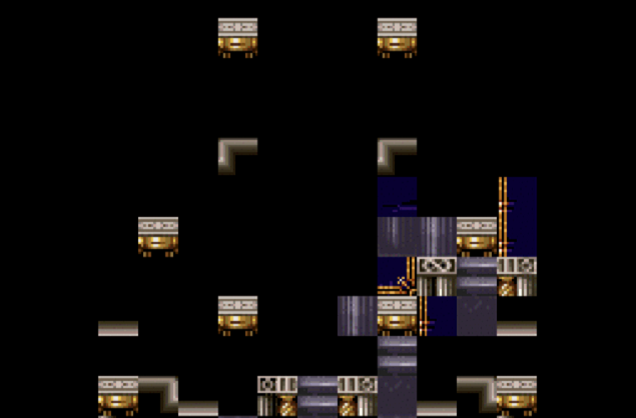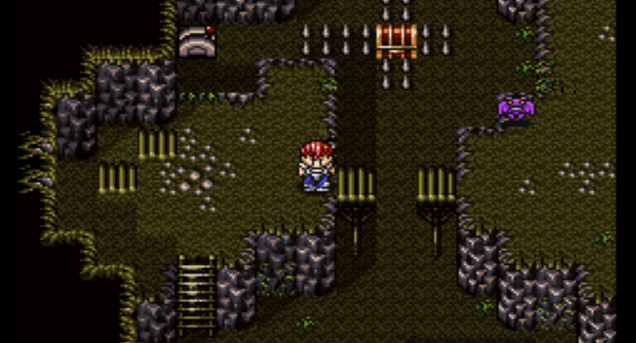The one thing I always remember about Lufia II is the bushes. See, there’s this one dungeon near the end of the game where you have to figure out how to slash down a whole bunch of tufts of grass, but every time you make a move, a bunch of those bushes regenerate.
With crafty use of your bush-destroying items — your sword, your flame arrows, your bombs — you can clear them all at once. But it takes a crapload of trial and error, and it nags away at your brain for a few minutes. When you do finally pull it off, all that frustration immediately disappears. Catharsis!
Lufia II, a prequel to Lufia (and an exponentially better game), was developed by a Japanese studio named Neverland and released for the Super Nintendo in the mid-1990s. Though it doesn’t often get as much Classic Cred as games like Chrono Trigger and Final Fantasy VI, Lufia II at least deserves to be in the conversation for Best Super Nintendo RPGs Ever Made. (Natsume later published a DS remake of Lufia II, but they changed so much that it’s essentially a different game, so we’re only talking SNES here.)
The best way to describe Lufia II might be “a cross between Final Fantasy and Zelda, with way more puzzles.” The structure is rigid: you, the Hero, adventure across the world in linear fashion, going from town to dungeon ad infinitum until the game ends. Conveniently-placed guards and other obstacles ensure that you can only go where the story wants you to go, and by the time the world opens up toward the end of the game, you’ve already seen almost everything.
And then there are the puzzles.
I’ve been replaying Lufia II for our Grand Summer JRPG Adventure, and the one question I keep asking is: why don’t other RPGs have puzzles like this?
Instead of just throwing mazes and monsters at you, dungeons in Lufia II challenge you to think about what you’re doing, where you’re going, and even how many steps you’re taking. Some of the puzzles are obvious — put this jar on a button — but as you progress through the game, they get increasingly difficult, until you get to tons of tricky, deliriously fun puzzles like the Never-Ending Bushes. There’s even one optional task called The Most Difficult Puzzle In The World (though it probably isn’t).
Lufia II is also smart in how it makes movement matter — enemy encounters are displayed on screen, but those monsters will only move when you move, in a mechanic reminiscent of the original Rogue. (There’s even a 100-floor dungeon called Ancient Cave that offers procedural, Rogue-like dungeon-crawling.) Different monsters have different behaviour sets — some move fast, some move slow, some chase you, etc. To get through each dungeon, you have to both discern these monsters’ patterns and figure out whether you want to fight or avoid them. Sometimes, you have to actually use monsters in puzzles, manoeuvring them around the room and trying to get them to stand on switches or fall into traps.
Really, I wonder why more RPGs haven’t given their dungeons the type of elegance and intelligence that Lufia II had. It’s a shame other Lufia games didn’t follow suit either.
Some other discussion questions, for anyone who’s been playing Lufia II with me:

- What do you think of the dialogue?
- Isn’t it neat how every character has their own little “voice” that takes the form of different “beep” octaves when they talk?
- Too many fetch quests?
- Dekar: great character or greatest character?
- What’s up with Maxim and Selan taking a yearlong break from their adventure to get married and have a kid? Weird pacing choice or ballsy, innovative move?
- Anyone get far enough to see this infamous screen?
Remember, next week we’re gonna discuss Soul Blazer, a game about talking trees.
Random Encounters is a weekly column dedicated to all things JRPG.

Comments
11 responses to “More RPGs Should Have Puzzles Like Lufia II’s”
Loved the Lufia games. Played the one on DS and was not impressed.
I loved the ancient cave sidequest in that game made for some great adventuring and time wasting especially if you ever made it to level 99!
This game is STILL one of my all time favourite games.
I think I was… 8 (?) when I had this game… And it was the first video game to make me a little teary at the end.
I did love how the characters had the different tones for their voices. Made me put more of an actual voice to them.
Dekar was a fantastic character. Loved his friendly rivalry with Guy.
I wish I could of used him in the final fight instead of Arty.
And I can’t seem to put a spoiler tag in my post, so I’ll just have to make do with the one part of Dekar’s that made me fist pump the air in cheer…!
I always remember the one puzzle I used to hate and could never remember how to do. That was the 3 coloured blocks puzzle. Where you had to lift and place only a certain amount to make them all disappear.
Granted, when I finished the harder of the two, I felt like an idiot because the soloution was staring me in the face 🙁
I thought that “infamous screen” only appeared in the emulated version of the game? Been a long time since I’ve owned the cartridge (and seeing how much the damn thing goes for now, I wish I had kept it).
HAHAHAHA that Same block puzzle gets me EVERY time i replay that game, everytime!!!
Yep, that was the one that got EVERYONE. My younger self had nightmares of this puzzle haha
“What’s up with Maxim and Selan taking a yearlong break from their adventure to get married and have a kid? Weird pacing choice or ballsy, innovative move? ”
What made this one of my favorite games to this day was the storytelling parts such as this. Only being young when I first played this game, this was my first experience with characters that actually evolved and felt real to me. Some people are too quick to label this as just another “chosen one” RPG and dismiss it before it gets into the thick of the plot. It’s not until the 1/2 to 3/4 way part though the game that you actually start to really see this game shine.
I still have my SNES set up on the TV and I am currently through another playthough. As for the puzzles, this was in the day when I couldn’t just jump on the internet and look at solutions and walkthoughs. I was maybe 8,9 when I played this? And still managed to finish it, with great concentration, it felt good to work it out myself 😛
“What’s up with Maxim and Selan taking a yearlong break from their adventure to get married and have a kid? Weird pacing choice or ballsy, innovative move? ”
I remember Maxim and the group assumed that Gades was the final big bad guy, and so after Gades’ defeat they had a full year of peace, serenity, and coitus. Then after the year passed, they discover that Gades’ appearance was only the beginning, and the adventure wasn’t truly over.
The awesome thing about Lufia II’s puzzles are that a great majority of the puzzles contain themselves in a single room. They were challenging, witty, kind of like the puzzles you’d find on the Sunday newspaper.
Other RPG’s puzzles usually require random exploring, back tracking, defeating everything in a room, or molesting every item or NPC in the room.
The characters weren’t very original, more like they were ripped straight out of an anime. Which isn’t a bad thing, I guess.
I also remember spending hours in Forfeit Casino, trying to win enough money to buy the Dragon Blade. My first taste of a gambling addiction.
Lufia 2 also has the best soundtrack. The Lufia 2 remake on the DS was a disappointment, but the great thing out of it was an OST CD with an orchestra playing the Lufia 2 tunes.
I actually fell in love with this game, when my best friend, who had it, got stuck at a certain block puzzle and challenged me to try to solve it (I did!) That was my first glimpse of the game and soon, both of us were addicted to it. So many memorable things:
-The ancient cave and its coveted blue shells with legendary weapons.
-Evolving your pet via the items you gave it to eat.
-The super fun games at the casino.
-Selan eventually falling for Maxim even though she initially hated his guts.
-Dekar.
-That ending.
This game and Breath of Fire 2 were the SNES JRPGs that converted me at a very early age. Still absolutely love them, no idea how much is nostalgia and how much still holds up these days. Kinda scared to go back and find out.
Seriously one of my favourite 16-bit JRPGs of all time- I think only Chrono Trigger, Secret of Mana and Terranigma eclipsed it. I loved the story, the characters were great (how many JRPGs are there where you get to control a married couple as the main characters?), the gameplay was tight and polished (the IP system was a particularly nice touch) and there were a whole crapton of bonus extras like the capsule monster system and the Ancient Cave (which even had its own New Game+ mode dedicated entirely to it). The graphics were bright and detailed and the soundtrack -especially the Sinistral battle theme- was awesome. And yes, best puzzles ever, Truly a classic even by today’s standards.
The sad thing is that the developer of Lufia, Neverland (probably better know now for their Rune Factory series) went bankrupt and closed down last year. Some of the staff are at Marvelous AQL now, working on a new game, but I think that Square Enix by way of Taito owns the rights to Lufia so if we ever see it again, it’ll be as a shitty free to play phone game.